Executions Surge In Iran Amid Tensions, Global Distraction
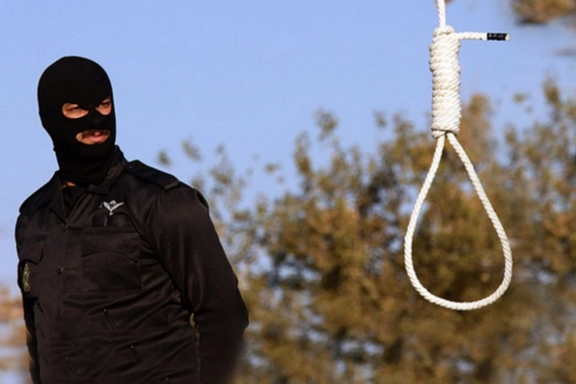
Recent reports from human rights organizations indicate a rise in the number of executions carried out in Iran.

Recent reports from human rights organizations indicate a rise in the number of executions carried out in Iran.
At least four people were executed in Hamedan, Esfahan (Isfahan), and Zanjan province prisons from April 11 through April 14, an apparent spike in state-sanctioned killings.
On Sunday and Monday, five prisoners were locked up in solitary confinement in Ghezel Hesar prison of Karaj, near Tehran, and one in Rasht prison in preparation for their executions.
The new wave of prison executions in Iran, which the Islamic Republic has initiated, seems to run concurrently with its missile and drone attacks on Israel, amid the global focus on its military actions. Also, some believe that after a brief lull during the month of Ramadan, the government has resumed the high rate of executions witnesses in the past few months.
Amnesty International issued a report on April 4 where it explained that there is a rise in executions in Iran. The report explained that 853 people were executed in 2023, the highest record in eight years, with over half being hanged for drug-related charges, reflecting an 89% increase from 2022.
More than 80 human rights groups last week issued a joint statement urging the United Nations to press Iran to end its prolific use of the death penalty, mostly in matters of drug offenses. The groups have urged the UN Office on Drugs and Crime to review its collaboration with Tehran and suggest that any continued collaboration should be pegged on Iran stopping the executions.
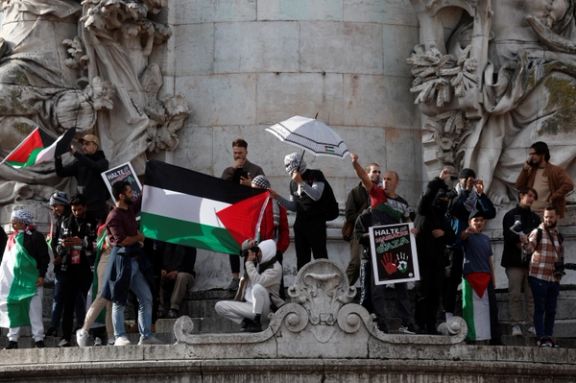
A highly confidential leaked document reveals the Iranian Revolutionary Guard (IRGC)’s role in directing an international campaign aimed at disrupting the world economy in protest against Israel.
Earlier today, Iranian opposition figure and activist Vahid Beheshti released a confidential letter signed by Brigadier General Majid Kazemi, head of IRGC’s Intelligence Security Organization. Kazemi was responsible for overseeing the IRGC’s operations, suppressing civil society in Iran, wrongfully arresting Iranian dissidents, including dual nationals, and overseeing the regime's brutal crackdown against protests across the country in response to the killing of Mahsa Amini in 2022, according US Treasury Department’s OFAC.
The letter from Kazemi, which is dated March 11, 2024 and titled “support and encouragement of Palestinian actions towards the political isolation of the Zionist regime," is addressed to Colonel Mohammad Sajedifar, the deputy of cultural and psychological operations of the IRGC Ground Force, and it states:
“Given the recent developments in the issue of Palestine and the psychological impact of the Al-Aqsa Storm operation on Palestinian communities in European and American countries, it was determined to implement significant support measures for April 15 and other rallies with the aim to achieve political isolation [of Israel].”
Alongside the letter, Beheshti shared the promotional video relating to the April `5 rallies, which Kazemi refers to in his letter adding:
“This video clip is the announcement of a collective movement aimed at disrupting the public order in Europe, USA, Australia and Asia all under the pretext of supporting Palestinians. This is a political movement intended to cause as much chaos and instability as possible, which are the exact goals of the Islamic Republic of Iran. The regime of the Islamic Republic has on multiple occasions, stated clearly that their goal is to destroy the modern society and build a global Islamic state.”
The video calls on the public to "block logistical hubs to stop the flow of capital worldwide”, to join the rally nicknamed A15, “a global economic blockade, answering the call from Gaza to fight for a liberated Palestine” on 15 April.
Beheshti further states that the rallies in Western countries are organized “directly in line with the mission of the Islamic Republic” and ordered by the IRGC.
In an interview with Iran International earlier Monday, Beheshti emphasized that the IRGC uses brainwashing tactics targeting youth in Western countries to cause chaos with such rallies being an example of these tactics.
Less than a month after the October 7 attack on Israel by Hamas, Iran’s ruler Ali Khamenei called for the blockade of oil and food exports to Israel and urged Muslim states to “not cooperate economically with the Zionist regime.”
Following Khamenei’s call, Yemen’s Houthis, a proxy of the IRGC, began targeting commercial vessels in the Red Sea with drones and missiles. The attacks have harmed international shipping and forces the US and UK to launch air attacks on Houthi bases.
The April 15 march organizers remain mostly anonymous. However, the video is heavily promoted by far-left groups, including Antifa, on social media. Uploaded to YouTube four days ago by A15 Economic Blockade, it directs viewers to their website, featuring a solidarity agreement among members to resist media, political, police, and “Zionist pressures”. The site emphasizes avoiding police communication or coordination regarding actions or fellow organizers.
Meanwhile, last year, the British police announced that the Islamic Republic regime is exploiting pro-Palestinian protests in Britain, according to the Times.
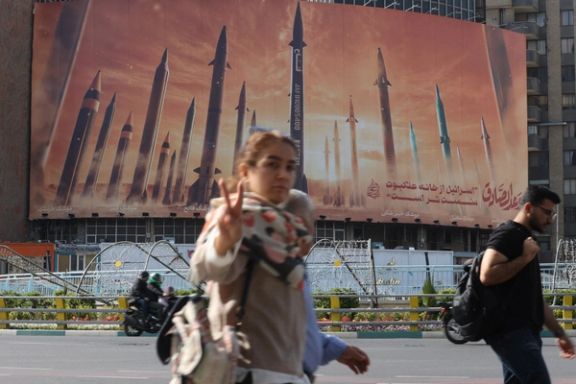
Iranian women are facing tougher crackdowns for refusing to wear the compulsory hijab in the shadows of Iran’s conflict with Israel.
While news of IRGC missile and drone operations against Israel over the weekend has overshadowed other events, on Saturday, as part of what they claim is a "national and public demand," the Iranian police have begun enforcing hijab regulations on women in a new initiative called the Noor plan, Persian for ‘light’.
Morality police are also back on the streets in full force, having been scaled back since the death of Mahsa Amini in 2022, with a stronger presence around Tehran’s central districts, full of police patrols, morality vans and police motorcycle patrols.
The 22-year-old Kurdish Iranian died in morality police custody suffering severe head wounds, sparking the strongest uprising against the regime since the founding of the Islamic Republic.
Businesses that do not comply with the regulations may find themselves closed down. Announced by Tehran’s police chief, Abbas Ali Mohammadian, it signals more oppression ahead for Iran’s women and girls.
"From today the police in Tehran, as in other provinces, will implement their measures against this sort of violation of the law regarding hijab," he said on live television on Saturday.
"People who did not pay attention to previous police warnings will be specially warned in the city from today and legal action will be taken against them," he added, just days after supreme leader Ayatollah Ali Khamenei said that women in the Islamic republic must obey the dress code, regardless of their beliefs.
A social media user wrote on X: "As a woman in Iran, the possibility of being killed by morality police is much higher than being killed by the attack of the Israeli army.”
Iran Human Rights reported the increased presence “at major crossings in Tehran”, noting that it is “their most significant show of force since the “Woman, Life, Freedom” uprising.
Video clips posted on social media also show citizens reporting that their car windows were broken by officers' batons, and others saying that they were assaulted by government motorcyclists as crackdowns worsen under the cover of Iran’s escalating shadow war with Israel.
Reports also suggest vehicles being seized and their owners punished for transporting women without veils. Authorities continue to shut down cafes and restaurants where the hijab rules were not enforced.
The escalating crackdowns on women come alongside Iran’s first direct attack on Israel from Iranian soil.
Over 350 projectiles were launched on Saturday night following the alleged April 1 Israeli air strike on the Iranian consulate in Damascus in which two senior IRGC commanders were killed along with several others.
It all comes while Iran’s controversial hijab bill, officially titled "Protection of Family Through Promotion of Hijab and Chastity Culture”, is awaiting approval, but officials have all but begun enacting its draconian regulations. Women now face even greater threat of arrest and punishments including travel bans for hijab defiance.
After initially securing parliamentary approval in September 2023, the draft was rejected for review by the Guardian Council, which is the ultimate legislative authority.
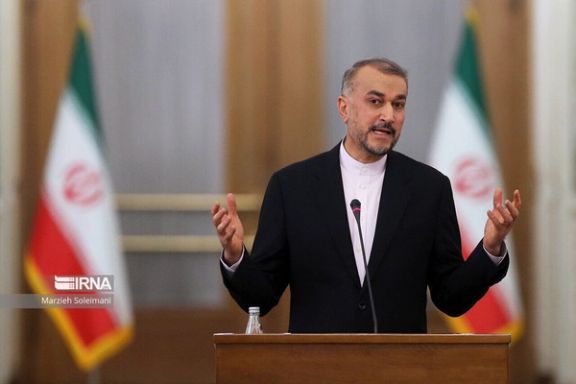
Iran's foreign minister warned on Monday of a harsh response if Israel decides to retaliate to Saturday night's onslaught of over 350 projectiles, telling his German counterpart that "the response will be immediate and all-encompassing".
Hossein Amir-Abdollahian spoke to Annalena Baerbock by phone on Monday and said, "The Islamic Republic aims to warn Israel of the consequences of crossing red lines".
His comments came after over 350 Iranian missiles and drones were launched towards Israel in the early hours of Sunday, 99 percent of which were intercepted by Israel and its allies, the US, UK, France and Jordan. It came after its consular facility was shelled in Syria earlier this month, killing seven Revolutionary Guards, including two senior officers.
Amidst the fears of a wider conflict, Abbas Golrook, a member of the National Security Commission of the Parliament, said, "I doubt that Israel will strike our civilian sites, not even our military ones." He noted, "Neither Iran, the region, nor the Americans have an inclination towards a widespread war," aware of the global repercussions. Amidst an economic crisis, a war for Iran would also be devastating, the country witnessing the worst recession since the establishment of the Islamic Republic in 1979.
Ahmad Alamolhoda, a firebrand cleric and Khamenei's representative in Khorasan Razavi province, echoed a long-standing threat issued by Iran's supreme leader. "Obviously, if any foolishness comes from Israel, Khamenei's promise to flatten Tel Aviv and Haifa will be realized," Alamolhoda declared. His statement referenced a 2013 warning from Khamenei, where he cautioned that any minor mistake by Israel could lead to devastating retaliation from Iran.
Follow developments on Iran International's Live coverage of ongoing tensions between Iran and Israel.
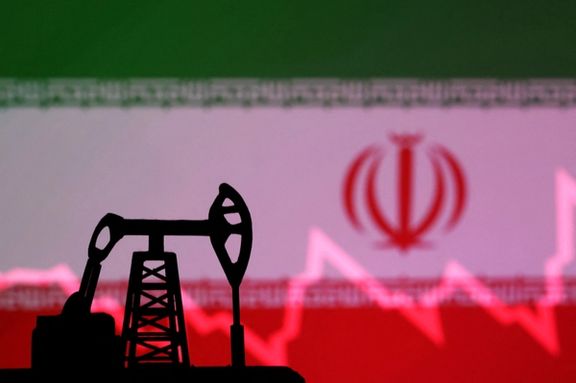
While Iran’s oil production remained largely unchanged, the country was able to increase its oil exports by selling millions of barrels from floating storage during the first quarter of 2024.
Oil production increased by only 18,000 barrels per day in the first quarter of the year to 3.188 million barrels per day (mb/d), compared to the last quarter, indicating a mere 0.5% growth in quarterly production, according to OPEC.
The country’s oil production growth has slowed dramatically since last summer.
Due to the sale of tens of millions of barrels from floating storage, Iran's oil exports increased significantly in 1Q24 to 1.5 mb/d, according to estimates by Kpler which provides real-time data on global commodity movements.
After the United States imposed sanctions on Iran’s oil exports in 2018, the country's oil exports declined from 2.6 mb/d to 330,000 barrels by late 2019 – leading to the stockpiling of about 110 million barrels of unsold oil on both water and land.
During President Joe Biden’s administration, however, the Islamic Republic was able to increase oil exports to its only customers: China and Syria.
Last year for instance, Iran exported about 1.3 mb/d of crude oil and gas condensate, 48% more than the previous year – of which 95% went to Chinese independent small refineries, called “teapots”.
A senior expert at Kpler told Iran International that the volume reached 1.5 mb/d in January-March 2024.

Kpler’s data indicates a significant increase in Iran’s oil exports during the first half of 2023, followed by a slight decline in the latter half of the year. Export growth then picked up again in the first quarter of 2024, although OPEC data suggested only a marginal increase in production levels.
The significant quarterly increase in exports by 140,000 b/d, despite a production growth of only 18,000 barrels in 1Q24, can be attributed to Iran selling more than 16 million barrels from floating storage during January-March 2024.
The process of oil transferring from Iran to China typically takes about three to four weeks.
According to Kpler’s statistics, Iran's floating oil storage decreased from 26.5 million barrels in early December 2023 to 10 million barrels in early February 2024.

Iran’s floating storage from June 2022 to mid-April 2024 (mb):
Source: Kpler
The statistics show that Iran's floating storage level doubled to 30 million barrels in mid-April, compared to the level in early March.
Although there are no statistics available about Iran’s oil production and export levels in April, the significant increase in floating oil levels indicates that Iran's oil exports likely declined during that month.
Oil revenues
Iran's oil export volume increased by 44% in the last Iranian fiscal year, ending on March 19, despite a 17% decrease in global oil prices. However, the country’s customs statistics indicate that oil export revenues only grew by 8% during this period.
According to Iranian customs data, the total value of oil and oil products (including mazut) exported by Iran amounted to $36 billion in the last fiscal year.
But, considering Iran's export levels of 1.3 million barrels per day (mb/d) of crude oil and gas condensate, along with 0.2 mb/d of mazut, and factoring in global oil prices, Iran's total oil export revenues should have exceeded $44 billion.
This suggests that approximately 19% of Iran's oil revenues were lost due to factors such as expenses related to bypassing US sanctions, including middlemen costs, ship-to-ship operations, and direct discounts offered to Chinese refineries.
Iran offered Chinese “teapots” approximately $13 per barrel in 2023 to maintain its market share, Reuters reported.
Additionally, the head of the Budget and Planning and Auditory Commission of the Iranian parliament stated on April 13 that Iran imported $2 billion worth of gasoline during the last fiscal year to compensate for fuel shortages.
Iran began importing gasoline in March, primarily from Russia and neighboring Southern countries.

The Iranian foreign ministry spokesperson stated on Monday that the US attempted to prevent the Iranian government from attacking Israel in a bombardment which saw over 350 projectiles launched on Saturday night.
Following Israel's targeting of the Iranian consulate in Damascus on April 1, Tehran and Washington exchanged messages aimed at preventing Iran's "legitimate response to the Zionist regime," according to Nasser Kanaani.
More than 350 drones and missiles were launched by Iran in response to an alleged Israeli airstrike that killed seven officers of the Islamic Revolutionary Guard Corps (IRGC), including two senior commanders.
Nasser Kanaani described Iran's action as "necessary and proportionate" and denied any prearranged agreement between Iran and any other country prior to the attack.
Blaming the US complicity for Israel’s attack on April 1st, Nasser Kanaani said: “The Zionist regime would not have had the courage to act against the Iranian consulate without the support of the US.”
According to the White House's top national security spokesperson, John Kirby, on ABC's "This Week" on Sunday, the United States will continue to assist Israel in defending itself but does not want to go to war with Iran.
Moreover, US officials stated on Sunday that President Biden informed Prime Minister Netanyahu that the US would not participate in any Israeli counter-offensive against Iran.
Follow developments on Iran International's Live coverage of ongoing tensions between Iran and Israel.






